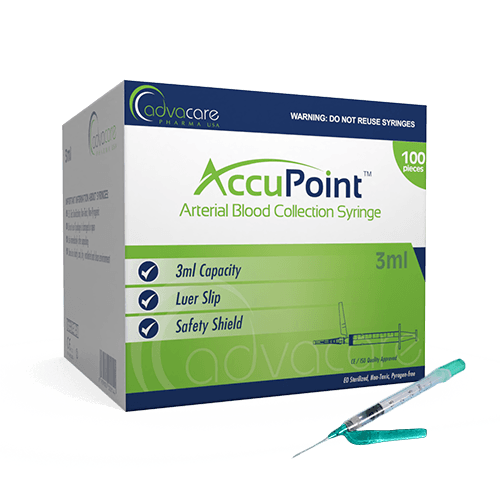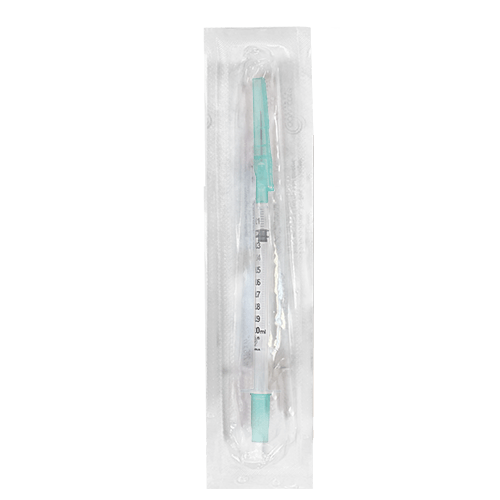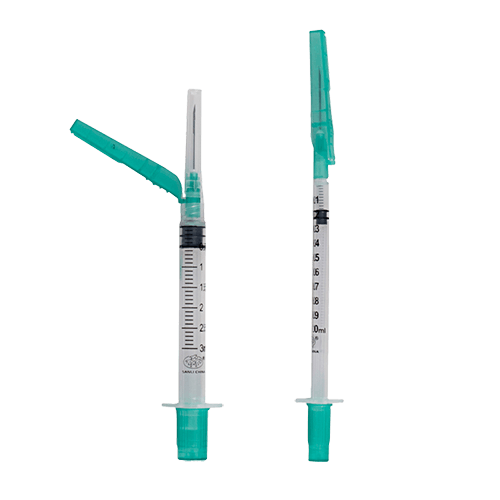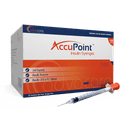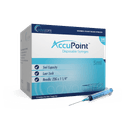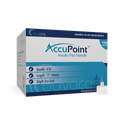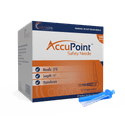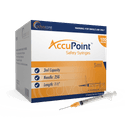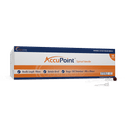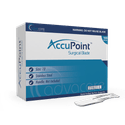- Home›
- Medical Devices›
- Injection Instruments›
- Injection & Precision Instruments›
- Arterial Blood Collection Syringes
Arterial Blood Collection Syringes
Tip Type
Needle Size
Capacity
Packaging
What are Arterial Blood Collection Syringes?
Arterial Blood Collection (ABC) Syringes are designed for drawing arterial blood samples for diagnostic tests, available in 1ml and 3ml capacities. These ABC syringes are pre-heparinized and use dry-sprayed, balanced and reduced heparin formulations, which help reduce the likelihood of clot formation.
Arterial blood collection must be performed by trained medical professionals who understand the risks and potential complications associated with the procedure. Proper technique and strict adherence to infection control protocols are essential to minimize the risk of infection and ensure patient safety.
AdvaCare Pharma is a leading manufacturer of Arterial Blood Collection Syringes, offering a comprehensive range of products designed for precision and reliability. Our facilities in China, India, and the USA are dedicated to providing the highest quality products and services to healthcare professionals worldwide.
Product Specifications
Tip Type
Luer Slip with Needle Safety Shield is a type of arterial blood collection syringe that features a push-on connection. This design allows the syringe tip to be easily slipped or pushed into the needle hub with the safety shield being an integral part of the needle. The single-handed activation of the safety design makes manipulation simple and safe.
Luer Slip is a commonly employed connection method utilized in arterial blood collection syringes. It involves inserting the syringe tip into the needle hub, ensuring a reliable and secure connection. This type of connection facilitates the smooth and accurate extraction of arterial blood samples, which are crucial for conducting diagnostic tests with precision and confidence.
Luer Lock is a robust and dependable connection mechanism characterized by a secure screw-type design. To establish the connection, the needle is firmly screwed into the syringe tip by rotating it clockwise. Once locked in place, it ensures a steadfast and reliable connection, specifically designed to maintain its integrity during arterial blood collection procedures. This feature enhances safety and accuracy by minimizing the risk of accidental disconnection, enabling healthcare professionals to perform arterial blood sampling with confidence and precision.
Why are we a leading Arterial Blood Collection Syringes manufacturer?
AdvaCare Pharma is a trusted partner to healthcare professionals worldwide, manufacturing Arterial Blood Collection Syringes in our state-of-the-art facilities with strict quality control measures in place. Our AccuPoint™ brand is recognized for its precision and reliability, and we offer STED dossiers for all products and CE, ISO and FDA certifications for certain product specifications. This demonstrates our commitment to innovation and excellence.
As a reliable supplier of medical devices, we understand that timely delivery is crucial, which is why we have an efficient global distribution network to ensure our products reach our partners as quickly as possible. Our expert teams are dedicated to providing exceptional customer service and support to help our partners succeed in their respective markets.
Uses
How should Arterial Blood Collection Syringes be used in hospitals?
In hospital environments, Arterial Blood Collection Syringes are indispensable for extracting arterial blood samples for a range of diagnostic evaluations, notably for arterial blood gas analysis which provides insights into the patient's respiratory efficacy and metabolic status:
- The procedure starts with the healthcare professional selecting a syringe of suitable size and needle gauge based on the specific requirements of the blood analysis and the patient's arterial diameter.
- Following rigorous site sanitation, the professional carefully inserts the needle into the artery, drawing the requisite volume of blood.
- This process demands precision to guarantee sample integrity and patient safety, underlining the necessity of skilled personnel for arterial blood sampling.
How are Arterial Blood Collection Syringes used in clinics?
Clinics leverage Arterial Blood Collection Syringes to obtain arterial blood for tests that demand arterial rather than venous blood, such as those assessing blood gases. This activity necessitates selecting a syringe that aligns with the volume needed for the tests and the patient’s specific health needs.
The clinician cleanses the puncture site, inserts the needle to collect the blood, then secures the sample within the syringe. Such precision in collecting blood samples allows for accurate diagnostics, contributing to great patient care.
How are Arterial Blood Collection Syringes utilized in medical centers?
Medical centers employ Arterial Blood Collection Syringes for gathering arterial blood, needed for diagnosing and monitoring patients across various settings. These syringes, in 1ml and 3ml capacities, offer flexibility for differing sampling requirements.
Prior to drawing blood, a medical professional assesses the appropriate syringe and needle size, prepares the puncture site, and then proceeds with the blood draw. The accuracy of these steps is paramount for diagnostic precision, emphasizing the function of these syringes in patient evaluation and treatment within medical centers.
How do doctors use Arterial Blood Collection Syringes?
Doctors utilize Arterial Blood Collection Syringes to extract arterial blood, which is pivotal for diagnosing various conditions.
They choose the appropriate syringe and needle gauge based on the patient's condition and arterial size, collect the blood with care, and confirm the sample's safe handling.
This meticulous approach allows for informed treatment decisions, showcasing the syringe’s place in patient diagnosis and management.
How are Arterial Blood Collection Syringes used by practitioners?
Practitioners, including nurses and lab technicians, routinely use Arterial Blood Collection Syringes for drawing arterial blood samples. Their expertise assures the accurate and safe collection of blood, affecting the reliability of diagnostic tests.
Practitioners select the syringe size and needle based on the procedure’s needs, prepare the site, and conduct the blood draw, demonstrating the syringe's utility in healthcare diagnostics and patient care.
By whom are Arterial Blood Collection Syringes typically used?
Medical professionals, such as doctors, nurses, and laboratory technicians, rely on Arterial Blood Collection Syringes for drawing arterial blood samples.
Their training enables the safe and precise collection of blood, underscoring the syringe's widespread use across healthcare settings for diagnostic purposes.
How do healthcare providers protect patient safety while using Arterial Blood Collection Syringes?
Healthcare providers adhere to stringent aseptic techniques, including thorough hand washing and site sanitation, to uphold patient safety during the use of Arterial Blood Collection Syringes.
They also utilize safety features, like needle shields, to prevent injuries, providing a secure blood collection process for both the patient and healthcare worker.
How do Arterial Blood Collection Syringes increase diagnostic accuracy?
Arterial Blood Collection Syringes offer precise collection of blood samples, leading to reliable diagnostic outcomes.
Their features, including different tip types and heparin coatings, minimize sample contamination and clotting, directly influencing the accuracy of diagnostic results.
How do healthcare professionals practice the proper storage and handling of Arterial Blood Collection Syringes?
Healthcare professionals maintain Arterial Blood Collection Syringes in controlled conditions, away from extremes, and handle them carefully to prevent damage or contamination.
Proper storage and handling practices are required for preserving syringe quality for accurate blood sample collection.
FAQs
How does an Arterial Blood Collection Syringe work?
Arterial blood collection syringes work by drawing a sample of arterial blood from an artery using a needle and syringe. The blood is then used for various diagnostic tests.
What is the difference between a luer slip and luer lock tip type?
Luer slip syringes have a smooth tip that fits into the needle hub, while Luer lock syringes have a threaded tip that screws onto the needle hub. Luer lock syringes are less likely to detach from the needle during use.
What needle sizes are available for Arterial Blood Collection Syringes?
Arterial Blood Collection syringes are available with a range of needle sizes, from no needle (for use with a separate needle) to 25G. The appropriate needle size should be chosen based on the size of the artery being accessed and the intended use.
What capacities are available for Arterial Blood Collection Syringes?
Syringes are available in 1ml and 3ml capacities. The appropriate capacity should be chosen based on the amount of blood needed for the intended test or analysis.
How should Arterial Blood Collection Syringes be stored and handled?
Syringes should be stored in a cool, dry place and protected from light. They should be handled with care to prevent damage or contamination, and should be disposed of in accordance with medical waste regulations.
Are your Arterial Blood Collection Syringes compliant with international regulatory standards?
Yes, our medical devices strictly adhere to international regulations, encompassing rigorous certifications like CE, ISO, and/or USFDA, to ensure utmost safety and efficacy on a global scale.
Am I allowed to distribute your Arterial Blood Collection Syringes in my territory?
Yes, we welcome partnerships with distributors in foreign countries who are interested in distributing our Class I and Class II medical devices within their markets. Contact our International Sales Department for more information and details about distribution in your country.
Is it possible to sell your Arterial Blood Collection Syringes to hospitals and clinics?
Our medical devices are suitable for distribution in hospitals, clinics, pharmacies and other healthcare facilities, where they can be used to provide high-quality patient care. Our efficient distributor verification process makes it easy to get started. Contact our International Sales Department for more information about the distribution of our medical devices in your market.
References
Impact of Syringe Material on Blood Gas Determinations
A study discussed on acutecaretesting.org highlights the transition from glass to plastic syringes for blood gas sample collection, emphasizing the implications on acid-base and gas analysis results. This transition was primarily motivated by cost, safety, and convenience. The study compares the permeability of plastic and glass syringes to oxygen and carbon dioxide, noting significant changes in blood gas measurements, particularly with plastic syringes when samples are stored on ice. It underscores the importance of analyzing blood gas samples within a specific timeframe to minimize errors in result interpretation and stresses the circumstances under which glass syringes might still be preferred.
Sampling and Storage Recommendations
The continuation of the study on acutecaretesting.org discusses the effect of storage conditions on blood gas values, particularly focusing on the stability of pO2 levels in samples collected in both glass and plastic syringes. It suggests that samples intended for blood gas analysis should be analyzed promptly, ideally within 30 minutes if stored at room temperature, to ensure accuracy. The document also reviews recent studies, including the influence of syringe material and storage temperature on blood gas stability, providing current recommendations for specimen collection and analysis.

You might be interested in...
Why AdvaCare Pharma?
As an industry leader, we are aware of our responsibility to provide affordable and sustainable solutions to improve healthcare worldwide.
